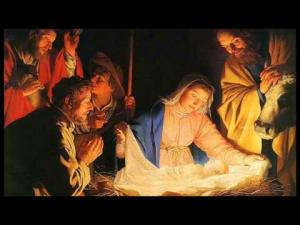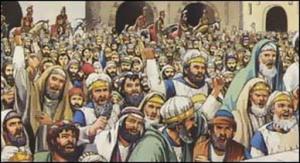
Recently the category of the impossible has become a theme for some theologians. If there’s going to be anything truly new in this world, it has to be something impossible becoming possible. If grace is effective in this world, it’s by making an impossible thing possible. Sometimes I’m convinced that only the impossible becoming possible will get me through a day or this country through a political season. That’s why I need Matthew and Luke’s infancy stories.
Sixth in a series of posts that I call “Stories of Jesus and the Character of God.” In this series I probe what historical Jesus scholars can say about the humanness and the earthly career of Jesus—beyond which historical research cannot go. The ultimate objective is to let this Jesus reveal the character of God. Contents and links to other entries in the series here.
These stories are not about some impossible things that happened once a couple thousand years ago. They are about the impossible becoming possible in my life. I can almost feel that as I make my way through the stories:
- The magi with their impossible quest, with only a star to guide them;
- The shepherds, who don’t belong in any respectable company, but, impossibly, angels visit them;
- Joseph, a righteous man who finds a way to do what no righteous man of that age would have done—take a pregnant women into his home,
- The journey to Egypt and back, reliving the impossible journey of the Hebrew people out of Egypt,
- The impossibilities of Jesus—a king born in such crowded conditions that Mary puts him in a manger, a precocious youth who amazes the gray learned men and then, more amazingly, turns his back on an interesting career, fame, and the chance to accomplish something in the world only to live for another 18 years in obscurity, subject to his humble parents.
When I think of it as history, these impossibilities leave me completely out of the picture. God made them happen once, but God doesn’t do things like that anymore, or at most only rarely and far away. But when I think of it as a story, then, like any good story, I have to think what it says about my own life. Is my future just an extension of my past? This story says something that just might be true about the real Jesus and me. A surprise, a genuine future, something radically new, and completely unforeseen is possible. Undeserved grace can lead us there. That challenges me to hope and to believe.
And the impossible traditional verities
The story also says all the things that a traditional imagination—complete with manger scenes and carols—finds.
- We live in God’s love, even when we feel like the least in other people’s eyes. We’re like the shepherds of the story and all the poor who crowded around Jesus during his later ministry.
- God takes the side of the poor and the homeless. The story truly symbolizes the way Jesus actually was both.
- God loves it when we are seekers like the magi following their star,
- and when we are brave like Mary, saying little and undertaking much,
- when we are confused like Joseph but willing to risk all for the ones we love,
- when we shout for joy like the angels or Anna in the temple, who just had to tell everybody about the baby Jesus,
- and when we are ready to depart the world like Simeon. He could say after seeing the baby, “Now, Lord, you can let me go. I’ve seen what I most longed to see.”
All of these are perfectly accurate as symbols; they don’t have to be history.
A political reading of the infancy stories
Much more lies in these stories. Some scholars look at the political situation of the Jews under Roman rule. They find not so subtle political meaning in the nativity stories.
- The real Son of God begins life in a stable in Luke’s Gospel. Caesar Augustus, living in the lap of luxury, called himself a “Son of God.” There could hardy be a stronger contrast. Rome bragged of bringing a “Pax Romana” to the world by force. The angels tell of true “peace on earth.
- The prophet Micah said of Bethlehem, “Out of you shall come one who is to be ruler of my people Israel.” In Micah’s day that was surprising. Bethlehem was an insignificant village. You wouldn’t expect great things from there. Christians added this saying to their story about a humble savior and made clear how unlike “the way things are” Jesus’ revolution is.
- Lowly shepherds are first to hear the news of the Savior’s birth. So little deference does the story give to the high and mighty.
Prosperous people today hardly notice the political meaning because they have little acquaintance with kings or oppression. But oppression has not gone away from our world; and the political meaning of the baby Jesus rings true for many.
If all the details in the infancy narratives were literally true, then I supposed you’d have proof (or at least Mary, Joseph, and the shepherds would have) that Jesus is divine or very near to it. But divinity didn’t enter so obviously into history. The infancy narratives tell us nothing remarkable about Jesus’ start in life that a historian can rely on. History comes into the picture, but not very much yet. These stories and images point the reader forward to the real historical figure of Jesus, encountering whom radically revised the possibilities of some of the people of his day. Christians believe that encountering him fills our world with new possibilities still.












